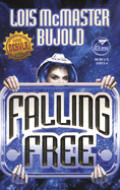
| Publisher: | Baen |
| Copyright: | April 1988 |
| Printing: | June 1999 |
| ISBN: | 0-671-57812-X |
| Format: | Mass market |
| Pages: | 307 |
While it takes place in the same universe as Bujold's Vorkosigan series, Falling Free takes place 200 years prior to the beginning of the series and doesn't have any direct ties to it. It does, however, has a similar style and feel and is worth reading as part of the series. It was one of the earliest books Bujold wrote in that universe.
The story is similar to, but less complex than, Miles's adventures. Leo Graf, an experienced welding engineer, is assigned as an instructor to an out-of-the-way space colony and discovers that his students are genetically engineered experiments. The quaddies have two additional arms instead of legs and various other improvements for life in freefall, and the corporation that created them is planning as using them as inexpensive slaves for space work.
The rest of the plot is predictable from there. Leo begins encouraging the quaddies to think outside of the careful psychological conditioning they've been given (although that process was already underway) and figures out what's going on. The quaddies rebel against the company breeding program and the authoritarian, blustering manager who replaced the beloved doctor who created them. Together, they hatch a complex plot to escape and high adventure ensues.
The issues raised here aren't exactly deep. Bujold creates charming, practical, but child-like characters in the quaddies, and one could pick apart the details of their background without too much difficulty. The psychology, as with other Bujold early work, is simplistic and a bit cliched. It's mainly there to set up the adventure. It's always clear who the good guys and the bad guys are.
For an adventure story, though, it's fun. The resolution is suitably ostentatious, there are plenty of complications and last-minute emergencies, and the villains are nicely hateable. The quaddies are charming (even if they're unrealistically united in view), and Bujold has a lot of fun with the differences in outlook and perspective in people designed for free-fall and without legs. One can't help but cheer for them.
This is a lightweight book, a good break from heavier stories. It doesn't require a lot of attention, but it's a fun good-triumphs-over-evil romp with likeable good guys. Recommended as light space opera.
Reviewed: 2005-10-27